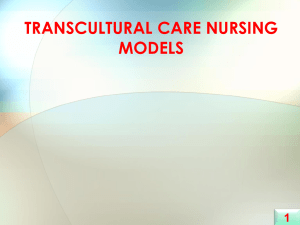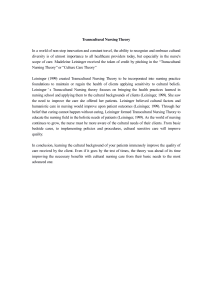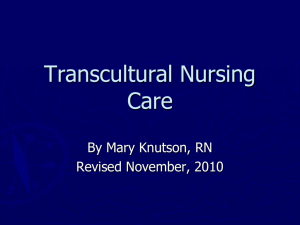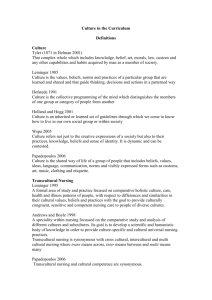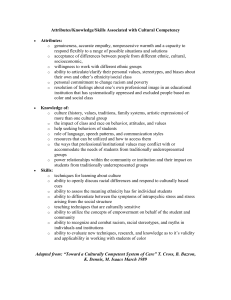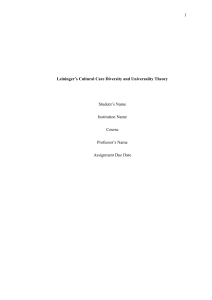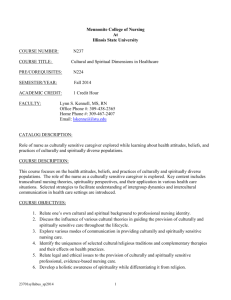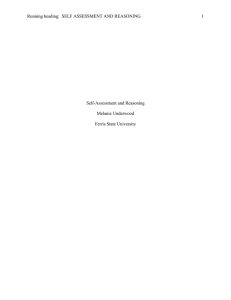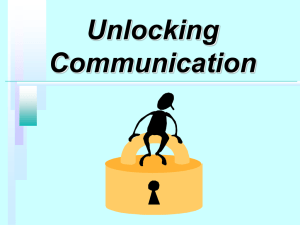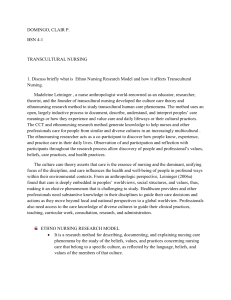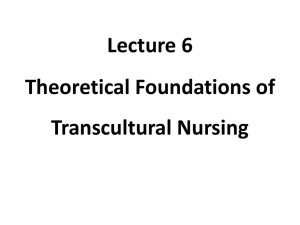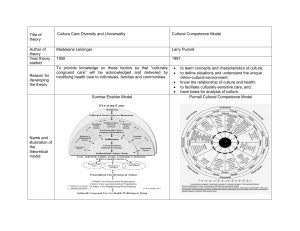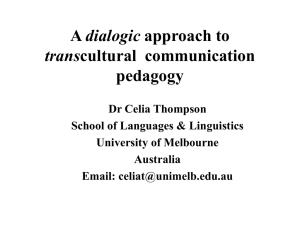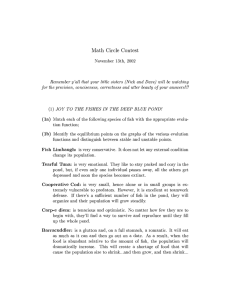Transcultural Nursing
advertisement
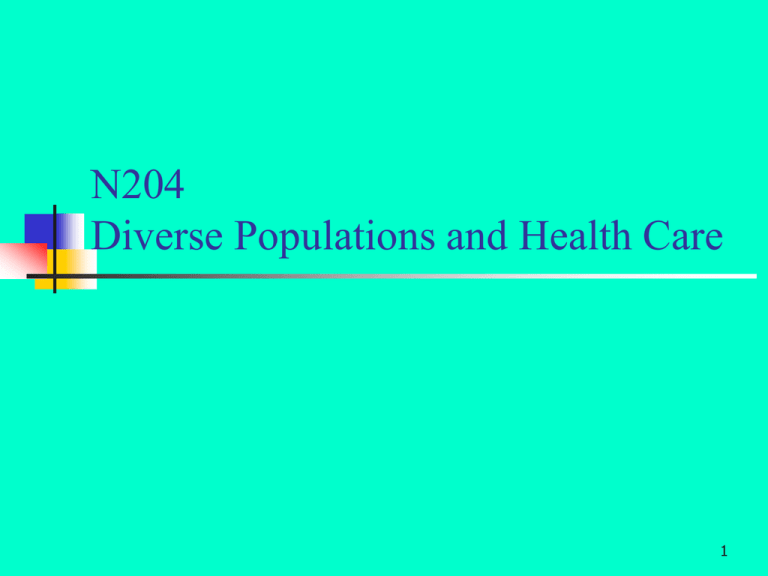
N204 Diverse Populations and Health Care 1 Agenda – 2/26/08 Paper presentation Next Week Paper presentation Virginia – 3 articles Elisa – 2 articles Indira - 3 articles Gracie – ? Rose - 2 articles Gracie - ? Transcultural Nursing Practice 2 3 Diversity Divertere in Latin Being different or having differences Diversity in nursing practice Providing competent care to clients from different cultures, conducting research in multicultural settings, and implementing educational programs to diverse population 4 Human migration 175 million migrants Pull & push factors– Misnomer – need and demand no job opportunities, unsafe work environment, lack of political stability, high workloads, or lack of economic remuneration In US. 500,000 qualified nurses who are not active or employed Misconception – Migration does not take place only from developing countries to industrialized nations. Padilla, P. (April/May,2006). Nurse migration and the nursing shortage. Breakthrough to Nursing, IMPRINT, 18-22 5 International travel & tourist Year # $ Meaning 1950 25 M 2006 763 M 622 B 10.3% of global economic output (excluding tourist spending) Employing 243 million Resource: Bremner, B. (April 23, 2007). Guiding tourists to Asia. Businessweek, retrived October 20, 2007 from http:// www.businessweek.com/globalbiz/content/apr2007/gb20070423_942361.htm?chan=search 6 Medical tourism Def: combination of travel to a foreign country to receive medical treatment while taking advantage of local tourism opportunities 1.3 million tourists per year seeking low-cost medical care abroad One of the world’s fastest growing industries – 30% a year (4 billion dollars industry within next few years) 7 Transcultural Nursing- Leininger, 1997 Definition- A formal area of study and practice focused on comparative holistic culture care, health and illness patters of people with respect to differences and similarities in their cultural values, beliefs, and lifeways with the goal to provide culturally congruent, competent and compassionate care 8 Cultural needs Equal access to treatment and care Respect for cultural beliefs and practices Leininger, (1995) & Narayanasamy, (2003) Religious beliefs, taboos, customs Dietary, personal care needs, daily routines Dying needs Communication needs Cultural safety needs, 9 Cultural needs (Cont’d) Pain Health practice Time orientation Space Family 10 Equal access to treatment and care Ethnicity racial discrimination, racial harassment and oppression Secondary problems stress psychological trauma 11 Communication needs Barrier Impede early detection delay prompt treatment and care Forms Language Non-verbal communication Translation services Interpreters Family interpreters Health condition – acute illness & crisis 12 Cultural safety needs Engage clients as partners Respect & rapport -> self-esteem Cultural negotiation & culture compromise 13 Transcultural Care Practice Initiative Enthusiasm Commitment of individuals and groups Strategic planning Organization & coordination of services Funding Education Recruitment & research 14 Giger-Davidhizar (2002) Assessment Model Culturally Unique Individual Communication Space Biological Variations Environmental Controls Social Organization Time 15 ACCESS Model – Narayanasamy, 2002 Assessment Communication Culture negotiation and compromise Establishing respect and rapport Sensitivity Safety 16 Campinha-Bacote’s Cultural Competence Model Cultural awareness Cultural skill Cultural knowledge Cultural encounters Cultural desire 17 Purnell’s Model Macro level – global society, community, family, individual, health Cultural domains – overview, communication, family roles, workforce issues, bioculturl ecology, highrisk behaviors, nutrition, pregnancy & childbearing practices, death rituals, spirituality, health care practice/practitioners Cultural consciousness Unknown phenomenon 18 Culturally Competent Organization US Census Bureau, 2000 – total population = 281,421,906 Latio 35.5 million = 12.1% African American = 12.9% Asians = 4.2% (60% is foreign born) Multiracial = 2.4% Ethnic minorities accounts for one fourth of the nation’s population In 2020, it will be near to 40% 10% of RNs in the US are from racial/ethnic minority background (2000)* 19 Organizational Diversity Competence Model (Frusti, Niesen, Campion, 2003) Drivers measurements Commitment Linkages Culture 20 Negotiation Process Listen: to the client’s perspective Teach: from your knowledge in language appropriate for client & family Compare: similarities & differences, disagree but do not devalue client’s view Compromise: if client treatment not harmful, promote If harmful, explain harm and suggest alternatives 21 Useful websites Internet: http://www. apna.org – American psychiatric nurses’ association sen.ca.gov – California State Senate cdc.gov – Center of disease control nami.org –National alliance for the mentally ill health.gov/healthypeople/document/ - healthy people 2010 library.sjsu.edu/staff/Peterson/Peterson.htm For statistical data: Census.gov/main/cen2000.html google.com/unclesam firstgov.gov factfinder.census.gov 22 23
